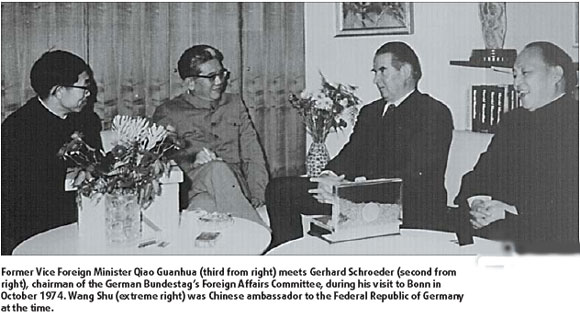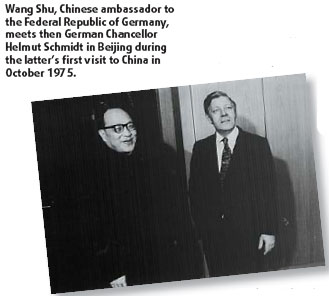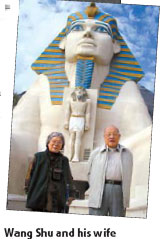A journalist and a diplomat

Often, a journalist may be honored as "a king without a crown," indicating the great role this profession can sometimes play in state matters. But what's the most amazing thing you would expect a foreign correspondent to do in the field of international relations? Help two countries establish a diplomatic relationship? That's the business of statesmen and diplomats, you may assert. But that is exactly what Wang Shu, a journalist who went on to become China's ambassador to the Federal Republic of Germany, succeeded in doing.
"When I was sent by the Xinhua News Agency to Bonn, capital of the then Federal Republic of Germany, to be a foreign correspondent in 1969, I found myself in an awkward situation," Wang recalled. At that time, he knew almost nothing about the country, much less its language.
Originally, he thought it was a temporary mission, and that he would soon be replaced by someone with a more suitable background. Even so, it was not like him to lie down on the job.
Undaunted by his 45 years of age, Wang, who spoke fluent English and French, began to study German from scratch.
After a year's hard work, he managed to overcome the language barrier, while at the same time acquainting himself with the political and social conditions of the Federal Republic of Germany.
Further, as a result of his excellent performance at work, he was made Xinhua's resident correspondent in that country.
Besides daily news coverage, Wang also showed great interest in studying significant international issues, the Sino-German relationship in particular.

"I didn't think China and West Germany had the right image of each other at that time, according to my impression and study," said Wang.
Some Chinese at the time wrongly believed that West Germany was still dominated by militarism and revanchism.
However, after a thorough study, Wang concluded that the German people were tired of wars and longing for peace. More importantly, he found that all political parties in West Germany, irrespective of whether they were in power or not, were interested in developing friendly relations with China.
Given this, Wang cautiously wrote a proposal to the Chinese leaders, suggesting that they invite Gerhard Schroeder (not the erstwhile German Federal Chancellor), vice chairman of the opposition Christian Democratic Union party and chairman of the German Bundestag's Foreign Affairs Committee, to visit China, so as to create pressure on the ruling party to hold official talks with China over the establishment of diplomatic relations.
This seemingly audacious proposal was accepted by the Chinese central government, and Schroeder paid his first visit to China in July 1972, in the midst of intense international attention.
In the wake of this visit, the two countries began official talks on the issue of establishing diplomatic ties, in which Wang was appointed representative of the Chinese side.
It was unprecedented in China, if not in the world, for a news correspondent to act as a representative in an important diplomatic negotiation, which signified a great change about to take place in Wang's career.
More than 40 days later, the talks ended in the inking of a draft for the Communique on the Establishment of Diplomatic Relations between the two countries. On October 11, 1972, the foreign ministers of both countries signed the official Communique in Beijing.
Thereafter, Wang ended his 24-year career as a journalist and began to work for the Ministry of Foreign Affairs as a diplomat. Between September 1974 and November 1976, Wang was the Chinese Ambassador to the Federal Republic of Germany.
Special affection for Germany
"I have a special affection for Germany and its people," said Wang, now 83. He still follows Sino-German relations closely.

To commemorate the 30th anniversary of the establishment of diplomatic ties between China and Germany in 2002, Wang published an autobiography, recounting the events leading up to that historical moment. The book was translated into German and was displayed at the Frankfurt International Book Fair the same year.
Wang still visits Germany from time to time. "Now I go to Germany every two to three years, and it feels like visiting an old friend."
"Over the past 35 years, China and Germany have developed closer and closer cooperation in a wide range of fields, such as trade, culture, environmental protection, science and technology, and education, to name but a few."
Wang's remark is echoed by a string of encouraging statistics: Germany is China's biggest trade partner in Europe while China is Germany's largest Asian trade partner. The annual bilateral trade volume was $78.2 billion last year, more than 280 times that of 1972, when official diplomatic ties were established.
Cultural and educational exchanges have also advanced considerably. So far, China has set up eight Confucius Institutes in Germany, while the Goethe Institute is swiftly expanding its presence in China.
"I'm extremely happy to see the robust development of Sino-German relations," Wang said.
Asked to pick a favorite between his two professions, Wang smilingly said that though both were challenging, he preferred being a journalist because it had been his childhood dream.
"But to be a good journalist and a good diplomat, in the final analysis, require the same conditions: humility, cautiousness, and willingness to do thorough investigation and research."
(China Daily 08/25/2007 page9)














